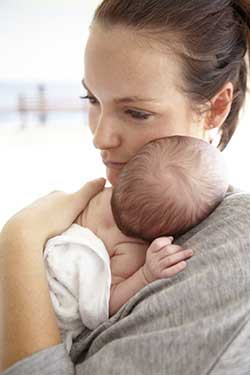Spina Bifida Treatment in Bristol, VA

Spina bifida (cleft spine) is a condition affecting infants in which the protective sheath surrounding the spinal column and spinal cord remains open and vulnerable to injury and infection.
Spina bifida is a birth defect, specifically a condition in a group of defects known as neural tube defects. The neural tube—during in-utero development—eventually becomes the baby's brain, spinal cord and surrounding protective tissue; typically closing completely by the 28th day following conception. In cases of spina bifida, the neural tube fails to close completely. The result can be spinal cord and vertebral defects.
Forms of Spina Bifida
Spina bifida occulta
This is the least severe of the three types. During development a small gap in the vertebral column remains. This case is typically asymptomatic (no symptoms) other than a few visual identifiers: a spot of unusual hair growth above the location, a fat deposit and a birthmark or dimple. Most cases go undiagnosed with patients living their lives unaware. However, some cases are coincidentally identified by unrelated imaging tests like a back X-ray.
Meningocele
This type is the most rare. In the meningeal presentation of spina bifida, the protective tissue surrounding the spinal cord pushes through the gaps between the vertebrae. This is typically corrected with surgery.
Myelomeningocele
Also known as open spina bifida and the type most people think of when hearing the term. In this case the spinal canal remains open, allowing the spinal cord to protrude, forming a pocket on the baby's back. The major risk with myelomeningocele spina bifida is meningeal infection, which can be life threatening.
Symptoms of this form can include:
- Neurological impairment
- Muscle weakness or complete paralysis (lower extremities like legs)
- Bowel and /or bladder issues
- Seizures
- Scoliosis
- Hydrocephalus (fluid retention/ accumulation in the brain)
Other symptoms:
- Latex allergy later in life
- Unitary Tract Infections (UTI)
- GI tract disorders
- Depression
Causes and Risk Factors of Spina Bifida
Little definitive information is known about the true cause of spina bifida, but listed below are some of the most up to date risk factors/ possible causes of this birth defect:
- Caucasians and Hispanics have been found to have a higher likelihood of developing spina bifida
- Females are more likely to develop the condition too
- A family history of spina bifida or neural tube birth defects can increase the risk
- Folic acid/ folate deficiency (Vitamin B-9, a member of the B-vitamin complex )
- Valproic acid intake (commonly used as an anti-seizure medication)
- Diabetes
- Obesity
- Hyperthermia (high core body temperature)
Discovering your newborn has spina bifida (cleft spine) can be a terrifying ordeal, but treatments do exist.
Request more information about Spina bifida today. Call (423) 482-8711 or contact Dr. Dalal Akoury online.
AWAREmed Health and Wellness Resource Center
Address
1604 Lamons LaneSuite 202
Johnson City, TN 37604
(423) 482-8711
www.awaremed.com
Hours
Mon:
9:00 am - 5:00 pm
Tue:
9:00 am - 5:00 pm
Wed:
9:00 am - 5:00 pm
Thu:
9:00 am - 5:00 pm
Fri:
9:00 am - 5:00 pm


